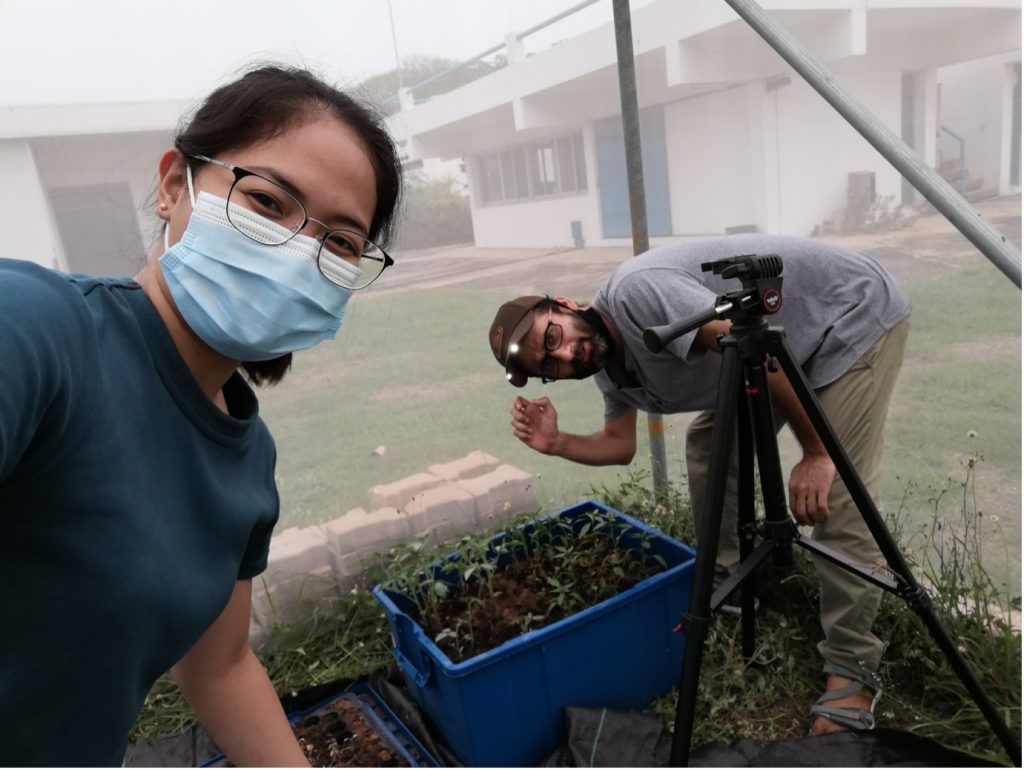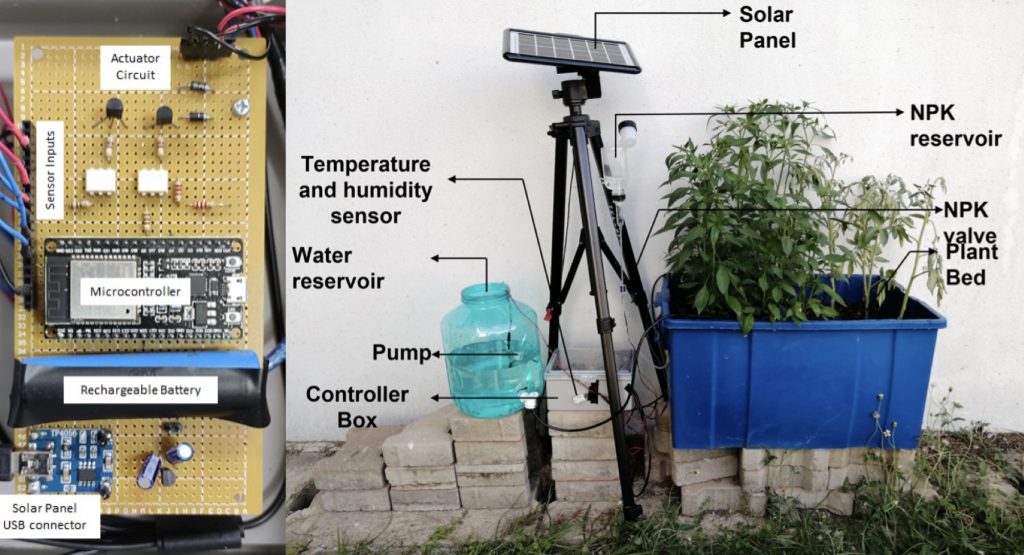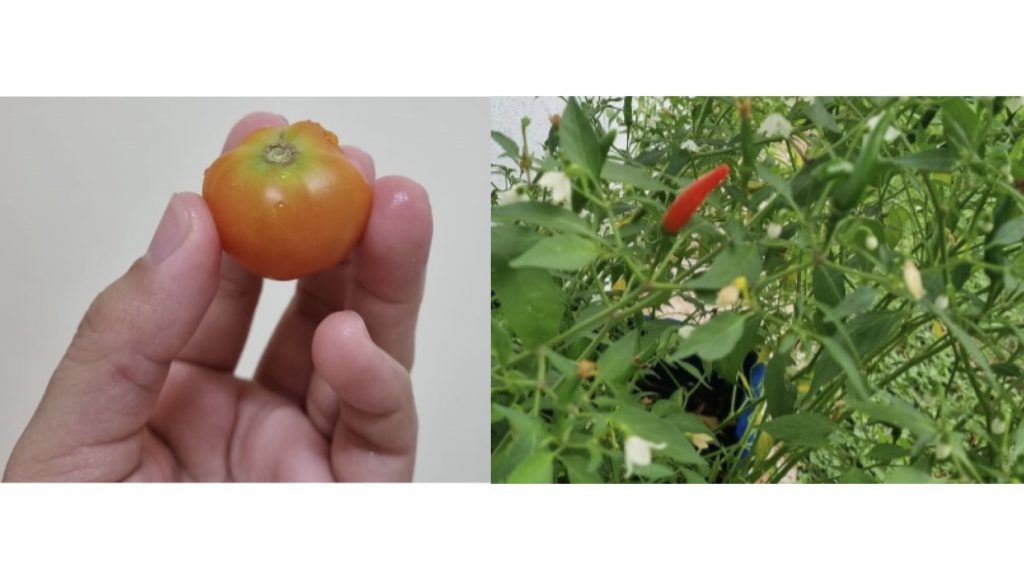By Nitipol Kiravanich and Mae Thiwari
February 24, 2022 -- Just because you are living in a small apartment in the city does not mean you cannot grow your own vegetables. With an Internet of Things (IoT) system developed by Tanka Nath Sharma and Lalaine Jean Ballais, master’s students from the Asian Institute of Technology (AIT) and recipients of ADB-JSP scholarship, growing your own tomatoes can be as easy as browsing TikTok clips on your mobile phone.
The device that makes urban farming easy and efficient is part of a paper recently published “IoT-Based Terrace Farming for Cities” in the IEEE (Institute of Electrical and Electronics Engineers) Xplore, by Sharma and Ballais, together with their fellow researchers Hun Win Thu and S.D. Arunya P. Sanadeera, under the supervision of Dr. Attaphongse Taparugssanagorn and Prof. Matthew N. Dailey. The paper was also presented to international audience at the 25th International Computer Science and Engineering Conference (ICSEC), held on November 18 – 20, 2021.
Met in the IoT System Design course, Sharma and Ballais came up with the idea as they both had shared similar problems while living in their home country, Bhutan and the Philippines respectively, of having no access to vegetables during the covid lockdown which affected the supply chain. Having grown his own vegetables, Sharma began to toy with an idea of designing an IoT system, with devices connected to the internet, that helps anyone grow short cycle crops – such as tomatoes, chilis, or basil leaves, etc. for their own consumption, on their own terrace – dubbing a system of “terrace farming for everyone”.

Lalaine Jean Ballais (left) and Tanka Nath Sharma (right)
To make it work, Sharma began with identifying key components of farming, what do plants need in order to grow? For him, the first challenge is how to know “what is going on inside the soil”. With that, he and Bellais started to work on ways to measure the primary nutrients inside the soil, namely Nitrogen, Phosphorus and Potassium or NPK. Other key components that affect nutrients that they have identified are soil moisture, humidity, and temperature, which can be measured by the levels of Oxygen and Carbon Dioxide inhalation.
Next step, Sharma and Ballais started working on designing equipment that can be applied to any balconies or backyards with limited space. The outcome is a system that is easy to install, working on any pre-existing Wi-Fi infrastructure, power efficient, and cost saving. It consists of a solar panel, sensors for temperature & humidity and NPK, NPK and water reservoirs, and water pump – all connected and operated through a controller box, capable of data monitoring; data storage; and system control. As the sensors send data to the controller box where the levels of NPK, temperature and humidity are measured, the controller then controls how much NPK and water should be fed into the vegetables in the pot. This information is accessible on your mobile phone so that all is left to do are harvesting your produce and filling NPK and water in the containers once in a while.

The system
“This project gives us hope in the future of gardening, even in places where we have limited spaces,” explains Ballais. In addition, Sharma hopes that seeing something grow will instill a love of nature and care for the planet in people living in the city, who may be disconnected from the natural world as they buy foods from supermarket. Speaking from experience, Sharma concludes “when a person is connected to nature by seeing the seed grows into a plant, then it dies and the cycle repeats, you feel more connected to the planet.”

Fresh produce from the system
Lastly, the two IoT engineers also hope to change the cityscape with greenery on the balcony. Given all these reasons and how easy it is to grow your own food, it is quite promising how our future can be greener and more sustainable.
Further reading:
Full published article “IoT-Based Terrace Farming for Cities”: https://ieeexplore.ieee.org/document/9684609
IoT Systems Engineering Program is designed to prepare individuals for the emerging technologies, researchers will learn the fundamental skills and knowledge required excel and ensure a promising IoT career. Find out more: https://set.ait.ac.th/programs/information-and-communications-technologies/iot/
The International Computer Science and Engineering Conference (ICSEC) is a forum for the researchers, practitioners and educators to present and discuss the most recent innovations, research, experience, trends and concerns in the field of Computer Science, Computer Engineering, Software Engineering, and Information Technology. More information: https://ict.up.ac.th/icsec2021/

